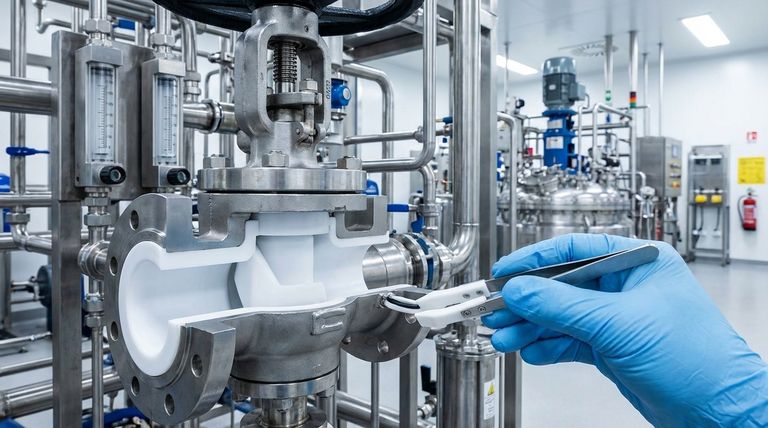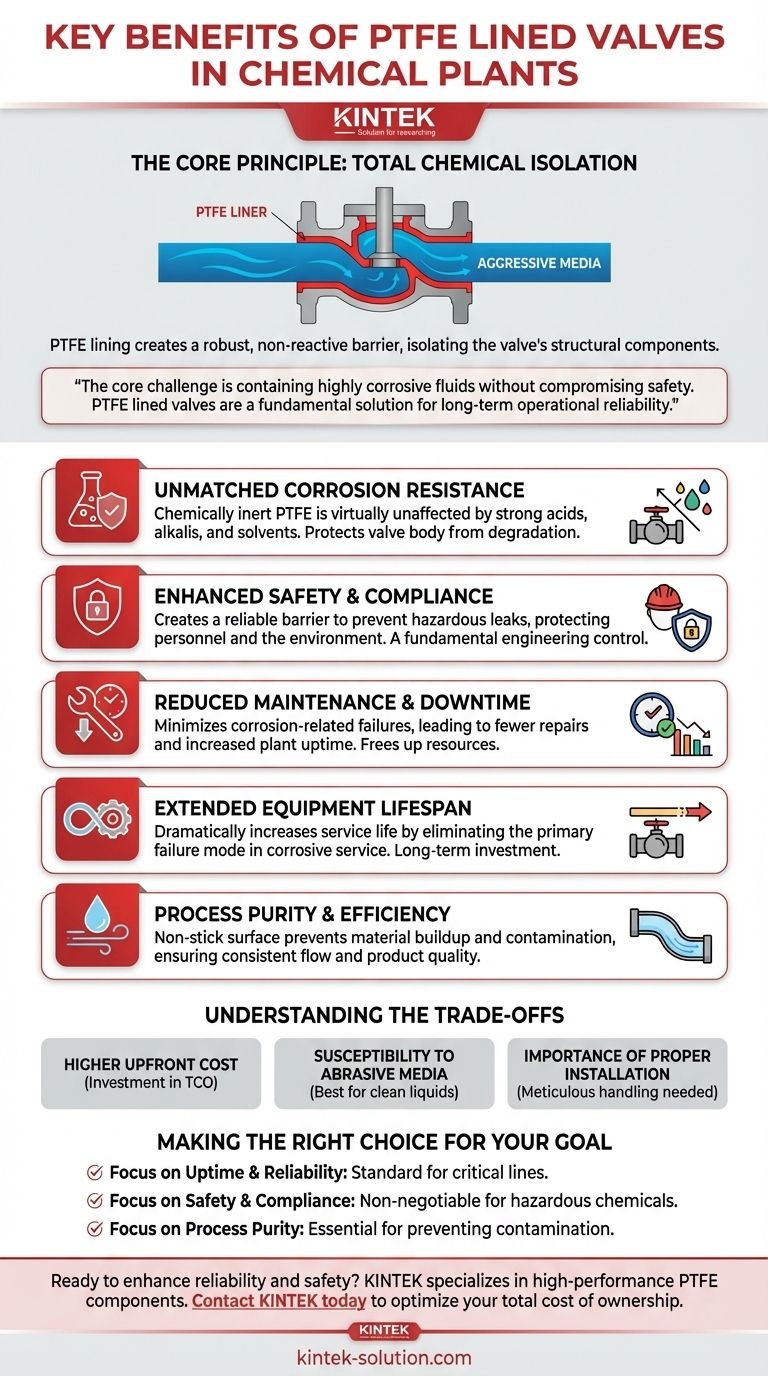In a chemical plant, the primary benefit of using PTFE lined valves is their exceptional chemical inertness and corrosion resistance. This lining creates a robust, non-reactive barrier that protects the valve's structural components from aggressive media, ensuring operational safety, extending the equipment's lifespan, and significantly reducing maintenance costs associated with corrosion-related failures.
The core challenge in chemical processing is not just moving fluids, but containing highly corrosive ones without compromising safety or process integrity. PTFE lined valves are not a minor upgrade; they are a fundamental solution that shifts the focus from managing constant repairs to achieving long-term operational reliability.

The Core Principle: Total Chemical Isolation
A PTFE lined valve's effectiveness comes from a simple, powerful concept: it completely isolates the valve's metal body (typically cast iron or carbon steel) from the process media. This turns an otherwise vulnerable component into a highly resilient one.
Unmatched Corrosion Resistance
The defining characteristic of Polytetrafluoroethylene (PTFE) is its chemical inertness. It is virtually unaffected by strong acids, alkalis, solvents, and powerful oxidants that would rapidly degrade even high-grade metal alloys. This makes it the default choice for handling the most aggressive substances.
High Thermal Stability
PTFE linings perform reliably across a wide operational temperature window. They remain effective at high temperatures, often up to 260°C (500°F), and retain their properties without becoming brittle at cryogenic temperatures as low as -100°C (-148°F).
A Non-Stick Surface for Process Efficiency
The famously low coefficient of friction of PTFE gives it a non-stick surface. In a valve, this prevents media from adhering to the internal surfaces, ensuring a smooth, consistent flow. This is critical for preventing material buildup, reducing pressure drop, and maintaining process purity.
Translating Protection into Operational Value
The physical properties of a PTFE lining directly translate into significant financial and safety advantages for a chemical plant. These are not theoretical benefits but tangible returns on investment.
Extended Lifespan and Reliability
By preventing corrosion—the primary failure mode for valves in chemical service—a PTFE lining dramatically extends the equipment's service life. This means fewer valve replacements and greater confidence in the system's long-term integrity.
Reduced Maintenance and Downtime
Valve failure leads to costly, unplanned shutdowns. Because PTFE lined valves are inherently durable in corrosive environments, they demand far less maintenance. This reduction in repairs and replacements maximizes plant uptime and frees up maintenance resources for other critical tasks.
Enhanced Safety and Compliance
The most critical benefit is safety. A corroded valve is a weak point that can lead to catastrophic leaks of hazardous materials. The reliable containment provided by a non-degrading PTFE liner is a fundamental engineering control for protecting personnel and the environment.
Understanding the Trade-offs
While highly effective, PTFE lined valves are not a universal solution. Acknowledging their limitations is key to specifying them correctly.
Upfront Cost Consideration
PTFE lined valves typically have a higher initial purchase price compared to standard, unlined metal valves. The decision to use them is an investment in Total Cost of Ownership (TCO), where the higher upfront cost is justified by massive savings in maintenance, downtime, and replacement costs over the valve's lifespan.
Susceptibility to Abrasive Media
PTFE is a relatively soft material. While excellent for clean, corrosive liquids, it can be susceptible to wear from highly abrasive slurries or media containing hard particulates. In such cases, other materials or valve designs may be more appropriate.
Importance of Proper Installation
The integrity of the liner is paramount. A deep scratch or improper flange torque during installation can damage the liner and create a path for corrosion to attack the valve body. Meticulous handling and adherence to installation procedures are essential.
Making the Right Choice for Your Goal
Selecting the right valve depends on balancing performance, safety, and cost. Your primary objective will guide your decision.
- If your primary focus is uptime and reliability: The superior lifespan and minimal maintenance needs of PTFE lined valves make them the standard for eliminating corrosion-related failures in critical process lines.
- If your primary focus is safety and environmental compliance: The secure containment and leak prevention offered by a robust PTFE lining are non-negotiable for handling highly corrosive or toxic chemicals.
- If your primary focus is process purity (e.g., pharmaceuticals, semiconductors): The inert, non-stick surface of PTFE is essential for preventing contamination, ensuring product quality, and enabling effective clean-in-place (CIP) systems.
Choosing a PTFE lined valve is an investment in the long-term stability and safety of your entire operation.
Summary Table:
| Key Benefit | Description |
|---|---|
| Exceptional Corrosion Resistance | Inert PTFE lining protects against strong acids, alkalis, and solvents, preventing valve body degradation. |
| Enhanced Safety & Compliance | Creates a reliable barrier to prevent hazardous leaks, protecting personnel and the environment. |
| Reduced Maintenance & Downtime | Minimizes corrosion-related failures, leading to fewer repairs and increased plant uptime. |
| Extended Equipment Lifespan | Dramatically increases service life by eliminating the primary failure mode in corrosive service. |
| Process Purity & Efficiency | Non-stick surface prevents material buildup and contamination, ensuring consistent flow. |
Ready to enhance the reliability and safety of your chemical processing operations? KINTEK specializes in manufacturing high-performance PTFE components, including custom-lined valves, seals, and liners. Our precision production and custom fabrication services—from prototypes to high-volume orders—ensure you get the exact solution for the demanding environments of the semiconductor, medical, laboratory, and industrial sectors. Contact KINTEK today to discuss how our PTFE expertise can solve your toughest corrosion challenges and optimize your total cost of ownership.
Visual Guide

Related Products
- Custom PTFE Parts Manufacturer for Teflon Parts and PTFE Tweezers
- Custom PTFE Parts Manufacturer for Teflon Containers and Components
- Custom PTFE Measuring Cylinders for Advanced Scientific and Industrial Applications
- Custom PTFE Sleeves and Hollow Rods for Advanced Applications
- Custom PTFE Square Trays for Industrial and Laboratory Use
People Also Ask
- What chemical processing applications involve PTFE-machined parts? Essential Components for Corrosive & High-Purity Systems
- What finishing techniques are effective for machined Teflon parts? Achieve Functional Performance and Dimensional Stability
- What are the unique properties of PTFE? Unlock Unmatched Performance in Demanding Applications
- What factors should be considered when choosing between Nylon and PTFE? Select the Right Material for Your Application
- What fabrication services are available for PTFE? Shearing, Stamping, Laser Cutting, Molding & Machining



















